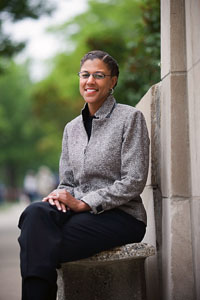Gina Miranda Samuels, Assistant Professor in the School of Social Service Administration
By William HarmsNews Office
 | |
In order to empathize with the needs of other people, students need to understand their own personal relationships, contends Gina Miranda Samuels, Assistant Professor in the School of Social Service Administration.
To understand the material she presents in her course, Family Systems Approaches to Practice, Direct Practice, which trains students to understand family dynamics when they begin their careers as social workers, Samuels asks students to look at their own family dynamics.
“I have them prepare geneaograms of their own families—diagrams that display intergenerational dynamics in their families,” she says. “They look at marriage, other relationships and how emotions are handled among family members,” she explains.
Once students begin looking at their own families, they can understand and respect the challenges their future clients may have in bringing about change in their own lives.
Samuels, who is this year’s winner of the William Pollak Award for Excellence in Teaching at SSA, comes to her job with a wealth of practical experience. She received a B.A. in social work in 1991 from the University of Wisconsin-Oshkosh and was a social worker before completing a Ph.D. in social work and social welfare from the University of Wisconsin-Madison in 2002, the year she joined the faculty at Chicago as an Instructor.
“What informs my teaching as much as my research is the fact that I have practiced social work. I draw on my experiences as a social worker to reach my students,” she says.
Samuels intuits what her students’ interests are in a course she teaches on direct practice. The course is a companion class to the work students do in the field.
“I have to balance the students’ optimism with reality,” she explains. Through classroom discussions, she learns about the enthusiasm of many of her students to change the world, as well as the discouragement some of her more experienced students feel with their capacity to bring about change.
“In my teaching, I always try to help students achieve a balance in their thinking. So for some, that means learning how to balance optimism with realism, and for others, it means balancing their skepticism with hope in the potential for human and societal change,” she says.
The discussions help them develop a variety of perspectives on social problems. “My goal is to try to challenge them to be critical thinkers, and that means there is very little meaning in my class attached to the terms ‘normal’ or ‘typical,’” she says. “I use videos and encourage debate in the class that has a comfortable level of disagreement.”
Samuels also works with students beginning their dissertation work in a seminar on qualitative methods. The discussions in that class are intended to show the value of qualitative research and develop standards of how best to use it.
“Many people think qualitative research does nothing more than provide illustrations to go with the numbers, which are the real research,” she says. “I try to help the students understand that in qualitative research, the words and quotes are our data. And the challenge becomes understanding the meaning of those words so we can understand our data.”
![[Chronicle]](/images/sidebar_header_oct06.gif)